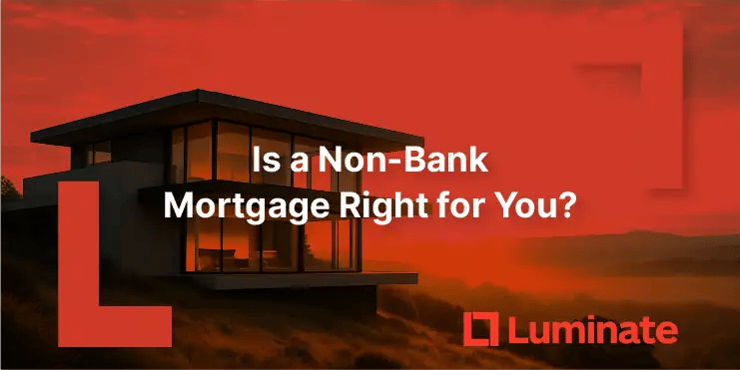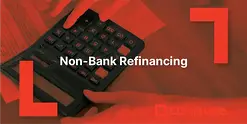Is a Non-Bank Mortgage Right for You? A Checklist for First-Home Buyers and Investors
 By
Trent Bradley
·
4 minute read
By
Trent Bradley
·
4 minute read

New Zealand’s mortgage market is changing. Tighter bank criteria, CCCFA obligations, and Reserve Bank DTI rules mean some borrowers are finding the bank pathway harder than expected. Non-bank lenders have become a mainstream option, not just a “last resort.” Use this checklist to decide if a non-bank mortgage could suit your situation.
Key Takeaways
- Non-bank mortgages aren’t about desperation — they’re about fit-for-purpose solutions.
- For first-home buyers, they can mean getting on the ladder sooner.
- For investors, they can unlock growth strategies banks may not support.
- A clear refinance plan keeps costs controlled and options open long-term.
Step 1: Assess Your Circumstances
- First-home buyer? Are you struggling to tick every bank box despite genuine ability to repay?
- Investor? Do you need portfolio lending, bridging finance, or flexible treatment of rental/short-stay income?
- Income type? Are you self-employed, is your income commission-based, seasonal, or from overseas?
- Credit profile? Do you have a recent blemish that doesn’t reflect your current financial position?
- Timeline? Are you working to an auction date or tight conditional deadline a bank may not meet?
Step 2: Understand What Non-Banks Offer
Non-bank lenders focus on flexibility and speed. They may:
- Accept alternative documentation such as bank statements or accountant letters.
- Assess income more holistically, including rental or overseas earnings.
- Offer bridging, near-prime, or interest-only options where banks cannot.
- Provide quicker decisions for time-sensitive purchases.
Step 3: Consider the Trade-Offs
- Rates: May be slightly higher than major banks in exchange for speed and flexibility.
- Fees: Check establishment and ongoing costs carefully.
- Exit strategy: Do you plan to refinance to a bank later once your profile fits?
Step 4: Build Your Checklist
Tick the boxes that apply to you:
[ ] I can afford the repayments but don’t fit my bank’s documentation requirements.
[ ] I’m self-employed, a contractor, or have multiple income streams.
[ ] I need to settle quickly (e.g. auction, bridging).
[ ] I’ve had a one-off credit issue but my finances are strong today.
[ ] I want flexibility in loan structure (interest-only, portfolio lending, non-standard terms).
Case Study Snapshots
- First-home buyer in Auckland: Approved by a non-bank using alternative income verification; refinanced to a bank 18 months later once tax returns caught up.
- Investor in Christchurch: Used non-bank bridging finance to secure a property ahead of settlement, then switched to bank funding once their existing sale went through.
Frequently Asked Questions
When should I consider a non-bank mortgage instead of going straight to a traditional bank?
Consider a non-bank mortgage if you're self-employed with solid income but inconsistent documentation, need faster approval for auction deadlines or bridging finance, have a recent credit blemish that doesn't reflect your current financial strength, or earn income from overseas, commissions, or seasonal work. Non-bank lenders assess your actual ability to repay rather than relying solely on rigid documentation requirements. If you've been declined by banks despite genuine repayment capacity, or if you need portfolio lending flexibility as an investor, non-bank options are worth exploring as a mainstream solution—not a last resort.
How much more expensive are non-bank mortgages compared to traditional banks?
Non-bank mortgage rates typically run 0.5-3% higher than major banks, with establishment fees of $1,500-$3,000 versus banks' $500-$1,000. On a $500,000 loan, the rate difference might cost an additional $685/month or roughly $8,220 annually. However, many borrowers use non-bank finance strategically for 12-24 months to enter the market or bridge a timing gap, then refinance to a traditional bank once their circumstances improve. The premium cost provides immediate access when banks say no, and the extra expense is often offset by property appreciation during that period.
What documentation do non-bank lenders accept that banks won't?
Non-bank lenders accept bank statements showing consistent deposits, accountant letters verifying business income, tax returns for self-employed borrowers, verified overseas income statements, and holistic income assessments that include rental income, commission structures, or seasonal earnings patterns. Instead of requiring traditional payslips and permanent employment contracts, they focus on your actual cash flow and demonstrated ability to service debt. This flexibility particularly benefits contractors, business owners, investors with multiple income streams, and expats with foreign currency earnings.
Can I refinance from a non-bank lender to a traditional bank later?
Yes, refinancing to a traditional bank is a common strategy. Most borrowers plan to refinance within 18-24 months once their situation improves—such as building stronger tax return history if self-employed, allowing credit blemishes to age, establishing stable employment patterns, or building sufficient equity through property appreciation and principal payments. Before choosing a non-bank lender, check for excessive early repayment penalties and ensure loan terms allow refinancing flexibility. Working with a mortgage broker helps you structure the initial non-bank loan with a clear exit strategy to lower-rate bank financing.
Do non-bank lenders work for investment properties or just first homes?
Non-bank lenders actively support property investors and often provide more flexibility than banks for portfolio lending. They're particularly valuable when you've hit a bank's internal lending limits despite strong portfolio performance, need bridging finance to purchase before selling another property, require interest-only terms banks won't offer, or want flexible treatment of short-stay rental income (like Airbnb). Non-bank lenders may assess your entire portfolio differently, recognizing rental income and asset strength that banks discount or ignore due to rigid DTI restrictions.
Will using a non-bank lender damage my credit score or future borrowing capacity?
No, borrowing from a non-bank lender doesn't harm your credit score—in fact, making consistent repayments improves it. Non-bank mortgages appear on your credit file the same as bank mortgages. The key is maintaining regular payments and building positive credit history. Many borrowers find that 12-18 months of perfect repayment history with a non-bank lender actually strengthens their position for refinancing to a traditional bank. Future lenders assess your demonstrated ability to service debt, and successful non-bank mortgage management proves exactly that capability.
Disclaimer: This checklist is for general information only and is not financial advice. Borrowers should seek professional guidance from a licensed financial adviser before making decisions.

Trent Bradley
Trent Bradley is a New Zealand financial advisor specializing in property-backed finance and investment consulting. With over 26 years of experience running his mortgage broking business, he has helped wholesale investors access high-yield property-backed loan opportunities. For the past 12 years, Trent has led Luminate Finance, a New Zealand finance company dedicated to connecting investors with secure property investment solutions.








